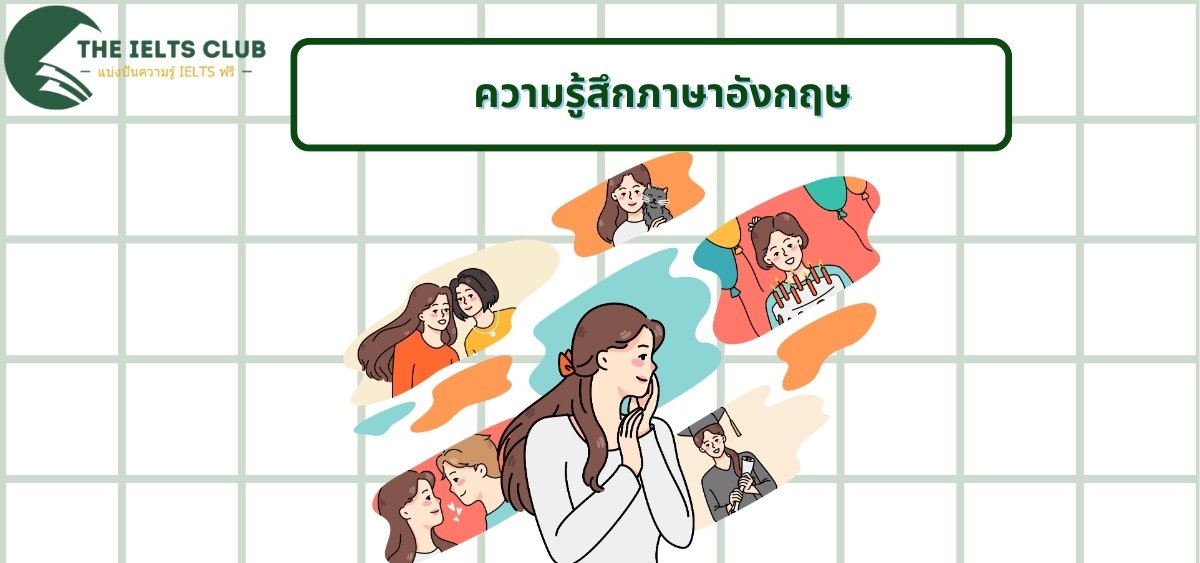ความรู้สึกภาษาอังกฤษเป็นส่วนสำคัญในการสื่อสารและแสดงอารมณ์ของเรา บทความนี้รวบรวมศัพท์และสำนวนที่ใช้บ่อยเกี่ยวกับความรู้สึก 100 คำ เพื่อช่วยให้คุณสามารถแสดงอารมณ์ในภาษาอังกฤษได้อย่างถูกต้องและหลากหลายมากยิ่งขึ้น ไม่ว่าจะเป็นความรู้สึกดีหรือไม่ดี ก็สามารถนำไปใช้ได้ในการพูดและเขียนภาษาอังกฤษของคุณ
I. ศัพท์บอกอารมณ์ในภาษาอังกฤษ
การรู้จักและใช้ศัพท์บอกอารมณ์ในภาษาอังกฤษเป็นทักษะที่สำคัญในการสื่อสาร ไม่ว่าจะเป็นการแสดงความรู้สึกดีๆ หรือความรู้สึกไม่ดี บทความนี้จะนำเสนอคำศัพท์และสำนวนที่ใช้บ่อยเกี่ยวกับความรู้สึกในภาษาอังกฤษ พร้อมทั้งตารางคำศัพท์เพื่อช่วยให้คุณเข้าใจและนำไปใช้ได้อย่างถูกต้อง
1. คำศัพท์ภาษาอังกฤษเกี่ยวกับความรู้สึกดีๆ

คำศัพท์เกี่ยวกับความรู้สึกดีๆ ช่วยให้เราสามารถแสดงความสุข ความพอใจ หรือความตื่นเต้นได้อย่างหลากหลาย ตัวอย่างเช่น:
| คำศัพท์ + หมวดหมู่ | การออกเสียง | ความหมาย | ตัวอย่างและการแปล |
| Happy (adjective) | /ˈhæpi/ | มีความสุข | She felt very happy after receiving the good news. (เธอรู้สึกมีความสุขมากหลังจากได้รับข่าวดี) |
| Joyful (adjective) | /ˈdʒɔɪfəl/ | มีความยินดี | The children were joyful during the holiday celebration. (เด็กๆ มีความยินดีในระหว่างการเฉลิมฉลองวันหยุด) |
| Excited (adjective) | /ɪkˈsaɪtɪd/ | ตื่นเต้น | He is excited about his upcoming trip. (เขาตื่นเต้นเกี่ยวกับการเดินทางที่กำลังจะมาถึง) |
| Elated (adjective) | /ɪˈleɪtɪd/ | รู้สึกดีใจมาก | They were elated by the team’s victory. (พวกเขารู้สึกดีใจมากกับชัยชนะของทีม) |
| Content (adjective) | /kənˈtɛnt/ | พอใจ | She felt content with her achievements. (เธอรู้สึกพอใจกับความสำเร็จของเธอ) |
| Pleased (adjective) | /pliːzd/ | พอใจ | He was pleased with the results of his hard work. (เขาพอใจกับผลลัพธ์จากการทำงานหนักของเขา) |
| Cheerful (adjective) | /ˈtʃɪərfəl/ | ร่าเริง | Her cheerful demeanor brightened everyone’s day. (ท่าทางร่าเริงของเธอทำให้วันของทุกคนสดใสขึ้น) |
| Grateful (adjective) | /ˈɡreɪtfəl/ | กตัญญู | She felt grateful for the support from her friends. (เธอรู้สึกกตัญญูสำหรับการสนับสนุนจากเพื่อนๆ ของเธอ) |
| Thrilled (adjective) | /θrɪld/ | ตื่นเต้นมาก | He was thrilled to win the competition. (เขาตื่นเต้นมากที่ได้ชนะการแข่งขัน) |
| Optimistic (adjective) | /ˌɑːptɪˈmɪstɪk/ | มองโลกในแง่ดี | She remains optimistic about the future. (เธอยังคงมองโลกในแง่ดีเกี่ยวกับอนาคต) |
2. คำศัพท์ภาษาอังกฤษเกี่ยวกับความรู้สึกไม่ดี
ในขณะที่เราต้องการแสดงความรู้สึกดีๆ การรู้จักคำศัพท์เกี่ยวกับความรู้สึกไม่ดีก็มีความสำคัญเช่นกัน เพื่อให้สามารถสื่อสารอารมณ์ได้ครบถ้วน ตัวอย่างเช่น:
| คำศัพท์ + หมวดหมู่ | การออกเสียง | ความหมาย | ตัวอย่างและการแปล |
| Sad (adjective) | /sæd/ | เศร้า | She felt sad after hearing the bad news. (เธอรู้สึกเศร้าหลังจากได้ยินข่าวร้าย) |
| Angry (adjective) | /ˈæŋɡri/ | โกรธ | He was angry about the delay in the project. (เขาโกรธเกี่ยวกับความล่าช้าในโครงการ) |
| Frustrated (adjective) | /ˈfrʌstreɪtɪd/ | รู้สึกหงุดหงิด | She was frustrated with the constant interruptions. (เธอรู้สึกหงุดหงิดกับการขัดจังหวะอย่างต่อเนื่อง) |
| Anxious (adjective) | /ˈæŋkʃəs/ | หวั่นวิตก | He felt anxious before the exam. (เขารู้สึกหวั่นวิตกก่อนการสอบ) |
| Depressed (adjective) | /dɪˈprɛst/ | ซึมเศร้า | She has been feeling depressed lately. (เธอรู้สึกลำบากใจในช่วงนี้) |
| Gloomy (adjective) | /ˈɡluːmi/ | มืดมน | The weather was gloomy, matching his mood. (อากาศมืดมน สอดคล้องกับอารมณ์ของเขา) |
| Irritated (adjective) | /ˈɪrɪteɪtɪd/ | รำคาญ | He was irritated by the constant noise. (เขารำคาญกับเสียงดังอย่างต่อเนื่อง) |
| Disappointed (adjective) | /ˌdɪsəˈpɔɪntɪd/ | ผิดหวัง | She was disappointed with the results of the test. (เธอรู้สึกผิดหวังกับผลลัพธ์ของการทดสอบ) |
| Lonely (adjective) | /ˈloʊnli/ | รู้สึกเหงา | He felt lonely after moving to a new city. (เขารู้สึกเหงาหลังจากย้ายไปยังเมืองใหม่) |
| Tense (adjective) | /tɛns/ | เครียด | She was tense before the important meeting. (เธอรู้สึกเครียดก่อนการประชุมสำคัญ) |
3. Hurt เจ็บปวด

คำว่า “Hurt” หมายถึงการรู้สึกเจ็บปวดทั้งทางกายและใจ สามารถใช้ในหลายบริบท เช่น:
| คำศัพท์ + หมวดหมู่ | การออกเสียง | ความหมาย | ตัวอย่างและการแปล |
| Hurt (verb) | /hɜːrt/ | เจ็บปวด | He was hurt during the game. (เขาถูกเจ็บปวดระหว่างเกม) |
| Hurt (adjective) | /hɜːrt/ | เจ็บปวด | She felt hurt by his comments. (เธอรู้สึกเจ็บปวดจากคำพูดของเขา) |
| Injured (adjective) | /ˈɪndʒərd/ | บาดเจ็บ | He was injured in the accident. (เขาบาดเจ็บในอุบัติเหตุ) |
| Painful (adjective) | /ˈpeɪnfəl/ | เจ็บปวด | The wound was painful and required immediate attention. (แผลเจ็บปวดและต้องการการดูแลทันที) |
| Wounded (adjective) | /ˈwuːndɪd/ | บาดเจ็บ | The soldier was wounded in battle. (ทหารถูกบาดเจ็บในการต่อสู้) |
| Agonized (adjective) | /ˈæɡənaɪzd/ | รู้สึกทรมาน | She was agonized by the loss of her pet. (เธอทรมานจากการสูญเสียสัตว์เลี้ยงของเธอ) |
| Throbbing (adjective) | /ˈθrɒbɪŋ/ | เจ็บปวดเป็นจังหวะ | His head was throbbing after the long meeting. (หัวของเขาเจ็บปวดเป็นจังหวะหลังจากการประชุมยาวนาน) |
| Sore (adjective) | /sɔːr/ | เจ็บ | Her muscles were sore after the workout. (กล้ามเนื้อของเธอเจ็บหลังจากการออกกำลังกาย) |
| Tender (adjective) | /ˈtɛndər/ | อ่อนนุ่ม, เจ็บ | The area around the cut was tender. (บริเวณรอบๆ รอยตัดเจ็บ) |
| Bruised (adjective) | /ˈbruːzd/ | มีรอยช้ำ | He had a bruised arm from falling off his bike. (เขามีรอยช้ำที่แขนจากการล้มจากจักรยาน) |
4. Anger โกรธเคือง
คำว่า “Anger” ใช้เพื่อแสดงถึงความโกรธเคืองหรือความไม่พอใจ:
| คำศัพท์ + หมวดหมู่ | การออกเสียง | ความหมาย | ตัวอย่างและการแปล |
| Anger (noun) | /ˈæŋɡər/ | ความโกรธ | His constant lateness caused her anger. (ความล่าช้าอย่างต่อเนื่องของเขาทำให้เธอโกรธ) |
| Angry (adjective) | /ˈæŋɡri/ | โกรธ | She was angry about the unfair treatment. (เธอโกรธเกี่ยวกับการปฏิบัติที่ไม่เป็นธรรม) |
| Furious (adjective) | /ˈfjʊəriəs/ | โกรธจัด | He was furious when he found out the truth. (เขาโกรธจัดเมื่อรู้ความจริง) |
| Irate (adjective) | /aɪˈreɪt/ | โกรธมาก | The customer was irate about the poor service. (ลูกค้ารู้สึกโกรธมากเกี่ยวกับบริการที่แย่) |
| Resentful (adjective) | /rɪˈsɛntfəl/ | รู้สึกโกรธเคือง | She felt resentful towards her colleague for taking credit. (เธอรู้สึกโกรธเคืองต่อเพื่อนร่วมงานของเธอที่รับเครดิต) |
| Irritated (adjective) | /ˈɪrɪteɪtɪd/ | รำคาญ | He was irritated by the constant noise. (เขารำคาญกับเสียงดังอย่างต่อเนื่อง) |
| Annoyed (adjective) | /əˈnɔɪd/ | รำคาญ | She was annoyed by the repeated interruptions. (เธอรู้สึกรำคาญกับการขัดจังหวะซ้ำๆ) |
| Enraged (adjective) | /ɪnˈreɪdʒd/ | โกรธจัด | He was enraged by the betrayal. (เขาโกรธจัดจากการทรยศ) |
| Outraged (adjective) | /ˈaʊtreɪdʒd/ | โกรธจัด | The community was outraged by the injustice. (ชุมชนรู้สึกรังเกียจกับความอยุติธรรม) |
| Vexed (adjective) | /vɛkst/ | รำคาญ | She was vexed by the constant delays. (เธอรู้สึกรำคาญกับความล่าช้าอย่างต่อเนื่อง) |
5. Peaceful สงบ

คำว่า “Peaceful” ใช้เพื่อแสดงถึงความสงบและไม่มีความวุ่นวาย:
| คำศัพท์ + หมวดหมู่ | การออกเสียง | ความหมาย | ตัวอย่างและการแปล |
| Peaceful (adjective) | /ˈpiːsfəl/ | สงบ | The park was peaceful in the early morning. (สวนสาธารณะสงบในตอนเช้า) |
| Calm (adjective) | /kɑːm/ | เงียบสงบ | She remained calm despite the chaos around her. (เธอยังคงเงียบสงบแม้ในความวุ่นวายรอบตัว) |
| Tranquil (adjective) | /ˈtræŋkwɪl/ | สงบ | The lake was tranquil under the clear sky. (ทะเลสาบสงบภายใต้ท้องฟ้าที่แจ่มใส) |
| Serene (adjective) | /səˈriːn/ | สงบสุข | Her expression was serene and composed. (สีหน้าของเธอสงบสุขและมีความสงบ) |
| Relaxed (adjective) | /rɪˈlæksd/ | ผ่อนคลาย | He felt relaxed after the yoga session. (เขารู้สึกผ่อนคลายหลังจากการฝึกโยคะ) |
| Placid (adjective) | /ˈplæsɪd/ | สงบ | The placid waters reflected the mountains perfectly. (น้ำสงบสะท้อนภูเขาได้อย่างสมบูรณ์แบบ) |
| Still (adjective) | /stɪl/ | เงียบสงบ | The night was still and quiet. (คืนนี้เงียบสงบและเงียบเงียบ) |
| Untroubled (adjective) | /ʌnˈtrʌbld/ | ไม่มีความวุ่นวาย | She enjoys a life that is untroubled by stress. (เธอเพลิดเพลินกับชีวิตที่ไม่มีความวุ่นวายจากความเครียด) |
| Hushed (adjective) | /hʌʃt/ | เงียบสงบ | The hushed room was perfect for meditation. (ห้องที่เงียบสงบเหมาะสำหรับการทำสมาธิ) |
| Serenity (noun) | /səˈriːnəti/ | ความสงบสุข | The garden exuded a sense of serenity. (สวนให้ความรู้สึกสงบสุข) |
6. Panic หวั่นวิตก
“Panic” หมายถึงความรู้สึกหวั่นวิตกหรือกังวลอย่างรุนแรง:
| คำศัพท์ + หมวดหมู่ | การออกเสียง | ความหมาย | ตัวอย่างและการแปล |
| Panic (noun) | /ˈpænɪk/ | ความหวั่นวิตก | There was a panic when the alarm sounded. (มีความหวั่นวิตกเมื่อเสียงเตือนดังขึ้น) |
| Panicked (adjective) | /ˈpænɪktɪd/ | หวั่นวิตก | She felt panicked during the earthquake. (เธอรู้สึกหวั่นวิตกในระหว่างแผ่นดินไหว) |
| Freaked out (phrasal verb) | /friːkt aʊt/ | ตกใจมาก | He freaked out when he saw the spider. (เขาตกใจมากเมื่อเห็นแมงมุม) |
| Agitated (adjective) | /ˈædʒɪteɪtɪd/ | รู้สึกกังวล | She was agitated by the sudden changes. (เธอกังวลเกี่ยวกับการเปลี่ยนแปลงที่เกิดขึ้นอย่างกะทันหัน) |
| Terrified (adjective) | /ˈtɛrɪfaɪd/ | ตกใจมาก | They were terrified during the storm. (พวกเขาตกใจมากในระหว่างพายุ) |
| Alarmed (adjective) | /əˈlɑːrmd/ | ตกใจ | He was alarmed by the loud noise. (เขาตกใจจากเสียงดัง) |
| Distressed (adjective) | /dɪˈstrɛst/ | รู้สึกทุกข์ใจ | She looked distressed after the bad news. (เธอดูรู้สึกทุกข์ใจหลังจากข่าวร้าย) |
| Hysterical (adjective) | /hɪˈstɛrɪkəl/ | รู้สึกหงุดหงิดอย่างรุนแรง | The crowd became hysterical during the emergency. (ฝูงชนกลายเป็นฮิสเตอร์ริกัลในระหว่างเหตุฉุกเฉิน) |
| Overwhelmed (adjective) | /ˌoʊvərˈwɛlmɪd/ | รู้สึกท่วมท้น | She was overwhelmed with fear during the blackout. (เธอรู้สึกท่วมท้นด้วยความกลัวในระหว่างไฟดับ) |
| Tense (adjective) | /tɛns/ | เครียด | The situation was extremely tense. (สถานการณ์เครียดอย่างมาก) |
7. Energized มีชีวิตชีวา
“Energized” ใช้เพื่อแสดงถึงความมีพลังและเต็มไปด้วยชีวิตชีวา:
| คำศัพท์ + หมวดหมู่ | การออกเสียง | ความหมาย | ตัวอย่างและการแปล |
| Energized (adjective) | /ˈɛnərdʒaɪzd/ | มีพลัง, มีชีวิตชีวา | After a good night’s sleep, she felt energized. (หลังจากนอนหลับสนิทคืนที่ผ่านมา เธอรู้สึกมีพลัง) |
| Vibrant (adjective) | /ˈvaɪbrənt/ | มีชีวิตชีวา | The city is known for its vibrant culture. (เมืองนี้เป็นที่รู้จักสำหรับวัฒนธรรมที่มีชีวิตชีวา) |
| Lively (adjective) | /ˈlaɪvli/ | กระฉับกระเฉง | The party was lively with music and dancing. (งานเลี้ยงมีชีวิตชีวาด้วยดนตรีและการเต้นรำ) |
| Dynamic (adjective) | /daɪˈnæmɪk/ | มีพลัง, เคลื่อนไหว | She has a dynamic personality that attracts others. (เธอมีบุคลิกที่มีพลังซึ่งดึงดูดผู้อื่น) |
| Active (adjective) | /ˈæktɪv/ | กระฉับกระเฉง | He leads an active lifestyle, engaging in various sports. (เขามีวิถีชีวิตที่กระฉับกระเฉง มีส่วนร่วมในกีฬาต่างๆ) |
| Vigorous (adjective) | /ˈvɪɡərəs/ | มีพลัง | The vigorous exercise routine improved her stamina. (การออกกำลังกายที่มีพลังช่วยเพิ่มความทนทานของเธอ) |
| Peppy (adjective) | /ˈpɛpi/ | มีชีวิตชีวา | The peppy music lifted everyone’s spirits. (เพลงที่มีชีวิตชีวาช่วยยกระดับจิตใจของทุกคน) |
| Animated (adjective) | /ˈænɪmeɪtɪd/ | มีชีวิตชีวา | The teacher was animated while explaining the lesson. (ครูมีชีวิตชีวาในขณะอธิบายบทเรียน) |
| Spirited (adjective) | /ˈspɪrɪtɪd/ | มีชีวิตชีวา, กระตือรือร้น | The team showed a spirited performance in the match. (ทีมแสดงการเล่นที่มีชีวิตชีวาในเกม) |
| Exuberant (adjective) | /ɪɡˈzjuːbərənt/ | เต็มไปด้วยพลัง | She was exuberant about her new job. (เธอเต็มไปด้วยพลังเกี่ยวกับงานใหม่ของเธอ) |
8. Tired เหนื่อย
คำว่า “Tired” ใช้เพื่อแสดงถึงความเหนื่อยล้า:
| คำศัพท์ + หมวดหมู่ | การออกเสียง | ความหมาย | ตัวอย่างและการแปล |
| Tired (adjective) | /ˈtaɪərd/ | เหนื่อย | He felt tired after the long journey. (เขารู้สึกเหนื่อยหลังจากการเดินทางยาวนาน) |
| Exhausted (adjective) | /ɪɡˈzɔːstɪd/ | เหนื่อยมาก | She was exhausted after running the marathon. (เธอเหนื่อยมากหลังจากวิ่งมาราธอน) |
| Weary (adjective) | /ˈwɪəri/ | เหนื่อยล้า | They were weary from the long day of travel. (พวกเขาเหนื่อยล้าจากวันที่ยาวนานของการเดินทาง) |
| Fatigued (adjective) | /fəˈtiːɡd/ | เหนื่อยล้า | The workers were fatigued after a full day of labor. (คนงานเหนื่อยล้าหลังจากวันทำงานเต็มวัน) |
| Drained (adjective) | /dreɪnd/ | เหนื่อยล้า | After the intense workout, she felt completely drained. (หลังจากการออกกำลังกายที่หนักหน่วง เธอรู้สึกเหนื่อยล้าอย่างสมบูรณ์) |
| Sluggish (adjective) | /ˈslʌɡɪʃ/ | เหนื่อย, เบื่อหน่าย | He felt sluggish after the heavy meal. (เขารู้สึกเหนื่อยหลังจากมื้ออาหารหนัก) |
| Spent (adjective) | /spɛnt/ | เหนื่อยล้า | She was spent after the long meeting. (เธอเหนื่อยล้าหลังจากการประชุมยาวนาน) |
| Drowsy (adjective) | /ˈdraʊzi/ | ง่วงนอน | The warm sun made him feel drowsy. (พระอาทิตย์อุ่นๆ ทำให้เขารู้สึกง่วงนอน) |
| Sleepy (adjective) | /ˈsliːpi/ | ง่วงนอน | After lunch, she felt sleepy and needed a nap. (หลังจากอาหารกลางวัน เธอรู้สึกง่วงนอนและต้องการงีบ) |
| Knackered (adjective) | /ˈnækərd/ | เหนื่อยมาก | He was absolutely knackered after the hike. (เขาเหนื่อยมากหลังจากการเดินป่า) |
9. Afraid กลัว
“Afraid” ใช้เพื่อแสดงถึงความกลัวหรือวิตกกังวล:
| คำศัพท์ + หมวดหมู่ | การออกเสียง | ความหมาย | ตัวอย่างและการแปล |
| Afraid (adjective) | /əˈfreɪd/ | กลัว | She is afraid of spiders. (เธอกลัวแมงมุม) |
| Scared (adjective) | /skɛrd/ | กลัว | He was scared by the loud thunder. (เขากลัวจากฟ้าผ่าเสียงดัง) |
| Fearful (adjective) | /ˈfɪərfəl/ | กลัว | They were fearful of the dark alley. (พวกเขากลัวซอยมืด) |
| Terrified (adjective) | /ˈtɛrɪfaɪd/ | ตกใจมาก | She was terrified during the thunderstorm. (เธอตกใจมากในระหว่างพายุฝนฟ้าคะนอง) |
| Frightened (adjective) | /ˈfraɪtənd/ | กลัว | The child was frightened by the loud noises. (เด็กคนนั้นกลัวเสียงดัง) |
| Petrified (adjective) | /ˈpɛtrɪfaɪd/ | กลัวมากจนไม่สามารถเคลื่อนไหวได้ | He was petrified at the sight of the snake. (เขากลัวมากจนไม่สามารถเคลื่อนไหวได้เมื่อเห็นงู) |
| Apprehensive (adjective) | /ˌæprɪˈhɛnsɪv/ | วิตกกังวล | She felt apprehensive about the upcoming exam. (เธอรู้สึกวิตกกังวลเกี่ยวกับการสอบที่จะมาถึง) |
| Uneasy (adjective) | /ʌnˈiːzi/ | ไม่สบายใจ | He felt uneasy walking alone at night. (เขารู้สึกไม่สบายใจเมื่อต้องเดินคนเดียวในเวลากลางคืน) |
| Jittery (adjective) | /ˈdʒɪtəri/ | หวั่นไหว | The caffeine made her feel jittery. (คาเฟอีนทำให้เธอรู้สึกหวั่นไหว) |
| Nervous (adjective) | /ˈnɜːrvəs/ | น่ากลัว | He was nervous before the job interview. (เขารู้สึกน่ากลัวก่อนการสัมภาษณ์งาน) |
10. Hopeful มีหวัง
“Hopeful” ใช้เพื่อแสดงถึงความหวังหรือความคาดหวัง:
| คำศัพท์ + หมวดหมู่ | การออกเสียง | ความหมาย | ตัวอย่างและการแปล |
| Hopeful (adjective) | /ˈhoʊpfəl/ | มีหวัง | They are hopeful for a positive outcome. (พวกเขามีหวังว่าจะได้ผลลัพธ์ที่ดี) |
| Optimistic (adjective) | /ˌɑːptɪˈmɪstɪk/ | มองโลกในแง่ดี | She remains optimistic despite the challenges. (เธอยังคงมองโลกในแง่ดีแม้จะมีอุปสรรค) |
| Encouraged (adjective) | /ɪnˈkʌrɪdʒd/ | ได้รับกำลังใจ | He felt encouraged by his friends’ support. (เขารู้สึกได้รับกำลังใจจากการสนับสนุนของเพื่อนๆ) |
| Hopeful (noun) | /ˈhoʊpfəl/ | คนที่มีความหวัง | As a hopeful, she continues to apply for scholarships. (ในฐานะคนที่มีความหวัง เธอยังคงสมัครขอทุนการศึกษา) |
| Confident (adjective) | /ˈkɒnfɪdənt/ | มั่นใจ | She is confident that she will succeed. (เธอมั่นใจว่าเธอจะประสบความสำเร็จ) |
| Positive (adjective) | /ˈpɒzətɪv/ | มีทัศนคติที่ดี | Maintaining a positive attitude helps in difficult times. (การรักษาทัศนคติที่ดีช่วยในช่วงเวลาที่ยากลำบาก) |
| Expectant (adjective) | /ɪkˈspɛktənt/ | คาดหวัง | They were expectant about the arrival of their new baby. (พวกเขาคาดหวังเกี่ยวกับการมาถึงของลูกน้อยใหม่ของพวกเขา) |
| Aspiring (adjective) | /əˈspaɪərɪŋ/ | มุ่งมั่น, มีความหวัง | She is an aspiring writer working on her first novel. (เธอเป็นนักเขียนที่มีความหวังที่กำลังทำงานในนวนิยายแรกของเธอ) |
| Hope-filled (adjective) | /hoʊp-fɪld/ | เต็มไปด้วยความหวัง | The community remained hope-filled despite the setbacks. (ชุมชนยังคงเต็มไปด้วยความหวังแม้จะมีอุปสรรค) |
| Faithful (adjective) | /ˈfeɪθfəl/ | มีความเชื่อมั่น | She remained faithful to her dreams. (เธอยังคงมีความเชื่อมั่นในความฝันของเธอ) |
อ้างอิง: คําศัพท์อาชีพ ภาษาอังกฤษ 100 อาชีพพร้อมคำอ่านและตัวอย่าง
II. สำนวนภาษาอังกฤษสำหรับการอธิบายอารมณ์ความรู้สึก
การใช้สำนวนในการอธิบายอารมณ์ความรู้สึกสามารถทำให้การสื่อสารของคุณดูเป็นธรรมชาติและหลากหลายมากยิ่งขึ้น นี่คือบางสำนวนที่นิยมใช้ในการแสดงความรู้สึก:
| สำนวนภาษาอังกฤษ | การแปลภาษาไทย | ตัวอย่างและการแปล |
| On cloud nine | ยิ้มแย้มไปทั่ว | She was on cloud nine after getting the job offer. (เธอยิ้มแย้มไปทั่วหลังจากได้รับข้อเสนอทำงาน) |
| Down in the dumps | รู้สึกเศร้า | He has been down in the dumps since his friend moved away. (เขารู้สึกเศร้าเพราะเพื่อนของเขาย้ายไป) |
| Bubbling with excitement | เปรี้ยวด้วยความตื่นเต้น | The children were bubbling with excitement before the party. (เด็กๆ เปรี้ยวด้วยความตื่นเต้นก่อนงานเลี้ยง) |
| In a good/bad mood | อยู่ในอารมณ์ดี/ไม่ดี | She is in a good mood today because it’s her birthday. (เธออยู่ในอารมณ์ดีวันนี้เพราะเป็นวันเกิดของเธอ) |
| At the end of one’s rope | รู้สึกหมดกำลังใจ | He was at the end of his rope after working overtime for weeks. (เขารู้สึกหมดกำลังใจหลังจากทำงานล่วงเวลาหลายสัปดาห์) |
| Walking on air | รู้สึกดีใจมาก | After receiving the award, she was walking on air. (หลังจากได้รับรางวัล เธอรู้สึกดีใจมาก) |
| On edge | รู้สึกตึงเครียด | He has been on edge due to the upcoming exam. (เขารู้สึกตึงเครียดเนื่องจากการสอบที่จะมาถึง) |
| In high spirits | มีความสุข, ร่าเริง | They were in high spirits during the celebration. (พวกเขามีความสุข ร่าเริงในระหว่างการเฉลิมฉลอง) |
| Over the moon | ยินดีมาก | She was over the moon about her promotion. (เธอยินดีมากเกี่ยวกับการเลื่อนตำแหน่ง) |
| Blue | รู้สึกเศร้า | He felt blue after watching the sad movie. (เขารู้สึกเศร้าหลังจากดูหนังที่เศร้า) |
IV. แบบฝึกหัดเกี่ยวกับความรู้สึกภาษาอังกฤษ
การฝึกฝนการใช้คำศัพท์และสำนวนเกี่ยวกับความรู้สึกภาษาอังกฤษเป็นวิธีที่ดีในการเสริมสร้างทักษะภาษาอังกฤษของคุณ นี่คือตัวอย่างแบบฝึกหัดเพื่อช่วยให้คุณเข้าใจและใช้คำศัพท์ได้อย่างถูกต้อง
แบบฝึกหัดที่ 1: เติมคำศัพท์ที่เหมาะสม
- She felt very _______ after receiving the good news. (happy / angry)
- He was _______ about the delay in the project. (peaceful / frustrated)
- They are _______ for their upcoming trip. (tired / excited)
- She was _______ by his harsh words. (hopeful / hurt)
- The kids were _______ during the party. (panicked / joyful)
- After a long day, he felt completely _______. (energized / exhausted)
- She remained _______ despite the challenges. (optimistic / miserable)
- He was _______ when he saw the snake. (afraid / delighted)
- The room felt _______ after everyone left. (serene / chaotic)
- She was _______ about her future prospects. (hopeful / depressed)
แบบฝึกหัดที่ 2: เลือกคำศัพท์ที่ถูกต้อง
- She is _______ of heights. a) hopeful
b) afraid - After running a marathon, he felt _______. a) energized
b) tired - The peaceful garden made her feel _______. a) angry
b) peaceful - He was _______ by the loud noise. a) excited
b) irritated - They were _______ about the upcoming exam. a) calm
b) anxious - She was _______ after the long meeting. a) energized
b) drained - He felt _______ during the thunderstorm. a) joyful
b) panicked - The artist _______ her latest paintings at the gallery. a) ignored
b) showcased - A chef _______ a delicious meal for the guests. a) prepared
b) neglected - The teacher _______ complex concepts in an easy way. a) confused
b) explained
คำตอบ:
แบบฝึกหัดที่ 1:
- She felt very happy after receiving the good news. (เธอรู้สึกมีความสุขมากหลังจากได้รับข่าวดี)
- He was frustrated about the delay in the project. (เขารู้สึกหงุดหงิดเกี่ยวกับความล่าช้าในโครงการ)
- They are excited for their upcoming trip. (พวกเขาตื่นเต้นเกี่ยวกับการเดินทางที่กำลังจะมาถึง)
- She was hurt by his harsh words. (เธอรู้สึกเจ็บปวดจากคำพูดที่รุนแรงของเขา)
- The kids were joyful during the party. (เด็กๆ มีความยินดีในระหว่างงานเลี้ยง)
- After a long day, he felt completely exhausted. (หลังจากวันทำงานที่ยาวนาน เขารู้สึกเหนื่อยมาก)
- She remained optimistic despite the challenges. (เธอยังคงมองโลกในแง่ดีแม้จะมีอุปสรรค)
- He was afraid when he saw the snake. (เขากลัวเมื่อเห็นงู)
- The room felt serene after everyone left. (ห้องสงบสุขหลังจากทุกคนออกไป)
- She was hopeful about her future prospects. (เธอมีความหวังเกี่ยวกับโอกาสในอนาคตของเธอ)
แบบฝึกหัดที่ 2:
- b) afraid
(She is afraid of heights. เธอกลัวความสูง) - b) tired
(After running a marathon, he felt tired. หลังจากวิ่งมาราธอน เขารู้สึกเหนื่อย) - b) peaceful
(The peaceful garden made her feel peaceful. สวนสาธารณะสงบทำให้เธอรู้สึกสงบ) - b) irritated
(He was irritated by the loud noise. เขารำคาญกับเสียงดัง) - b) anxious
(They were anxious about the upcoming exam. พวกเขาวิตกกังวลเกี่ยวกับการสอบที่จะมาถึง) - b) drained
(She was drained after the long meeting. เธอเหนื่อยล้าหลังจากการประชุมยาวนาน) - b) panicked
(He felt panicked during the thunderstorm. เขารู้สึกหวั่นวิตกในระหว่างพายุฝนฟ้าคะนอง) - b) showcased
(The artist showcased her latest paintings at the gallery. นักศิลปะจัดแสดงผลงานภาพวาดล่าสุดของเธอที่แกลเลอรี) - a) prepared
(A chef prepared a delicious meal for the guests. หัวหน้าพ่อครัวเตรียมอาหารอร่อยสำหรับแขก) - b) explained
(The teacher explained complex concepts in an easy way. ครูอธิบายแนวคิดซับซ้อนในแบบที่เข้าใจง่าย)
ความรู้สึกภาษาอังกฤษเป็นส่วนสำคัญในการสื่อสารและแสดงอารมณ์ของเรา การรู้จักและใช้คำศัพท์และสำนวนที่เกี่ยวข้องอย่างถูกต้องจะช่วยให้การสื่อสารของคุณมีความหลากหลายและมีประสิทธิภาพมากยิ่งขึ้น อย่าลืมฝึกฝนผ่านตารางคำศัพท์และแบบฝึกหัดต่างๆ เพื่อเพิ่มพูนทักษะและความมั่นใจในการใช้ภาษาอังกฤษของคุณ











